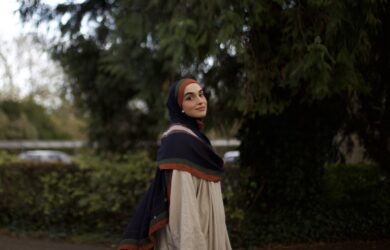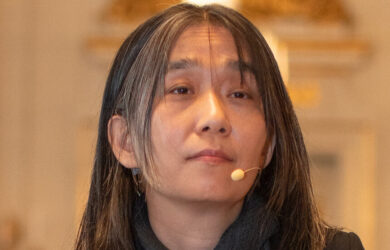Amy Zhang started to play tennis at the age of five. By high school, she was competing in national tournaments and by her late teens she was combining tennis with intensive studies in computer science, doing two and a half hours a day of practice most of the year, twice-weekly weightlifting sessions and matches. Two years ago her team of eight women players came fourth in the Big East tournament, a major tennis tournament in the US, and she won the 2010-11 Big East Institutional Female Scholar-Athlete Award.
Amy, a Gates scholar elect, was taught to play tennis by her parents after the family moved from Beijing where she was born. Her parents had moved to the US earlier – her father was doing a PhD in forestry at the University of Nebraska – leaving her with her grandparents until they were settled. She lived in Nebraska for a year and then the family moved to California for eight years after her father got a postdoctorate position at UCLA. He later became a network operator during the dot.com boom. The family then moved again to Texas in 2000. Amy says it was exciting to keep on the move and experience new things.
She says she played in junior tournaments in California, but then stopped for a while until she was at high school. “When I was younger I did not understand the point of practice,” she said. “I didn’t want to do it enough to be really good. But when I was at high school in Texas I sought tennis out and really enjoyed it. I wanted to win.”
She won an athletics scholarship to Rutgers University and majored in computer science. At school she had become interested in computer programming and was in the competitive programming team. At university she was president of a club called women in computer science which aims to promote women in computer science. She says that when she started her degree she didn’t know any women studying her subject. She got in touch with the Women’s Technology Empowerment Centre which had done award-winning work teaching women in Nigeria to use computers for daily tasks. Amy became involved in raising money for scholarships to a girls computer camp for 12 year olds in Nigeria.
In her junior year at university she was approached by a professor specialising in social media and worked with him on his research into what Twitter can teach us about local communities. It is this work that she hopes to expand on for her MPhil in Advanced Computer Science at Cambridge.
It will involve looking at how to organise and interpret information on social networking sites and discover social trends.”Organisations like Google have done a good job of organising information on the web,” she said. “But information like reviews and social comment is not really organised in any sort of way. I want to find a way to organise and interpret that information.”
She is delighted to have been chosen to be a Gates scholar. Despite her travelling for tennis, she has never been to Europe. She relishes getting to know her peers at Cambridge, particularly as she did not have much time to socialise during the interview process in New York. She arrived from a tennis tournament in Pennsylvania the evening before her interview and went straight to sleep.
She plans to continue with her tennis at Cambridge, but has broader ambitions for the future. “I would love to play in the tennis team at Cambridge and I can see myself doing coaching, but I do not see myself going pro,” she says. “I could not do tennis full time. It takes too much of a physical toll.”












